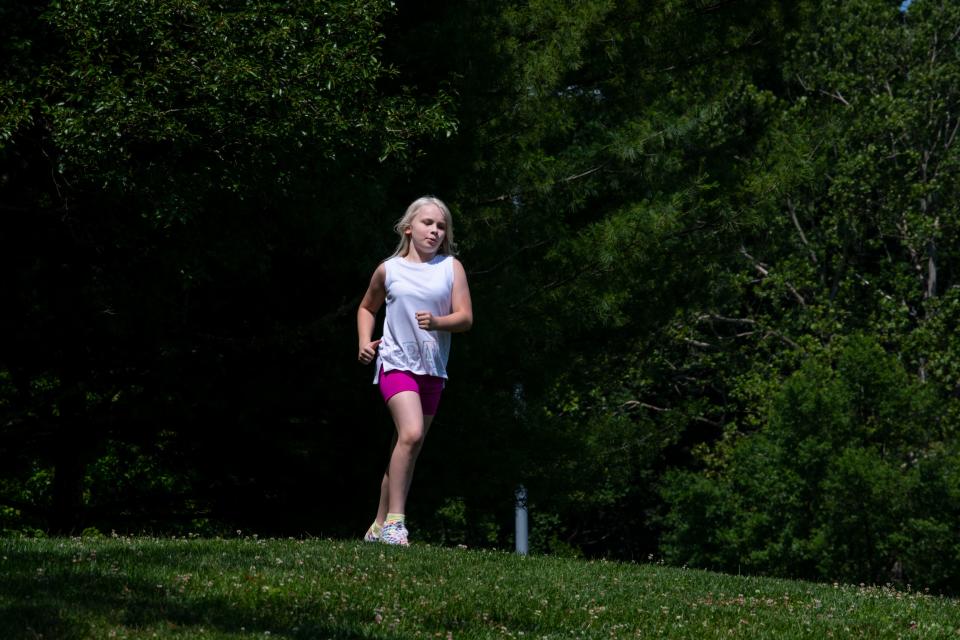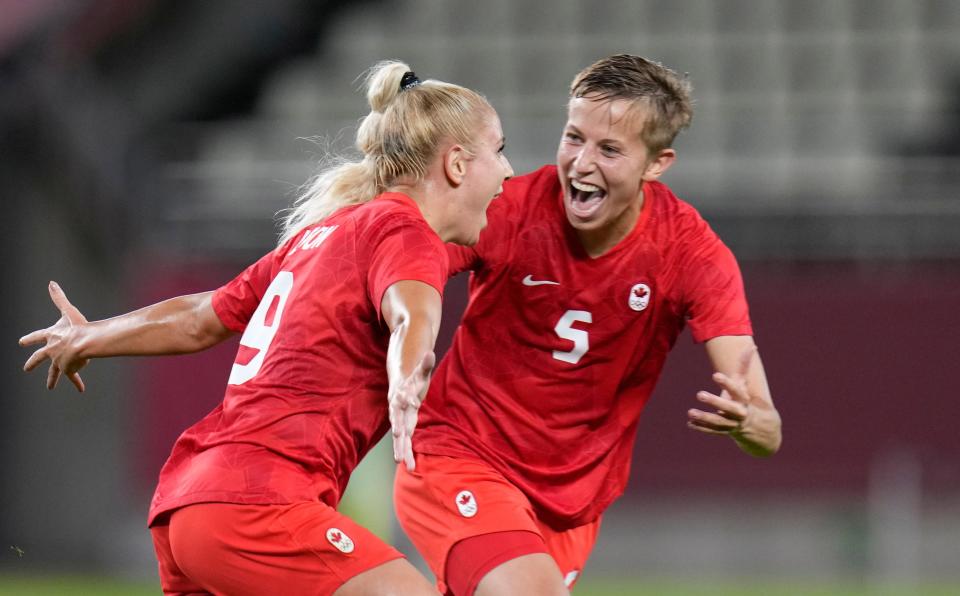As trans athlete bans sweep across US, 12-year-old Becky wonders: 'If we don't fight this, what happens?'
At first, Becky wasn’t sure what to make of the shot put and discus: The metal ball heaved from the crook of your neck demanded strength. The flat metal disc released after some fancy footwork required grace.
Both were starkly different than running, Becky’s first love. But she tried the events and excelled. Her mom Heather said the new sport made Becky "glow with excitement."
Becky is like most 12-year-olds. She loves sports because they help her make friends and teach teamwork, which she calls an "essential of life." She’s got bright blonde hair, plays in the school band and is excited to have art as an elective next school year.
She’s also transgender. As she shared in a declaration for the U.S. District Court for the Southern District of West Virginia, "I am a girl. I remember wanting to play in my mom’s clothing and always liking pink and 'girly' items. My mom has always been supportive of me, so talking to her about how I was feeling about being a girl and that I wanted to go by the name (Becky) felt normal to me."

But now, because of sharing her truth, Becky, who just finished the sixth grade in a small town in northern West Virginia, is one of hundreds of young children across the country who Republican lawmakers are trying to force to the sidelines.
Eighteen states, including West Virginia, currently ban transgender athletes from participating in sports that match their gender identity, a wave of anti-trans legislation that has left the LGBTQ community and its allies reeling. What’s more, most of these laws are impacting youth sports, where stakes are the lowest; at the Olympic and professional levels, many leagues and sport governing bodies have had transgender inclusion policies for years.
It’s left Becky, her parents and other children like her wondering what’s next. As their identity, the very core of their being, is debated on the national stage by politicians, can sports be a safe space?
USA TODAY Sports isn't using Becky's last name to protect her safety. The transgender community is over four times more likely than cisgender people to experience violence, according to data from the Williams Institute at UCLA School of Law. Also, according to 2022 survey data from the Trevor Project, a suicide prevention and crisis intervention organization for LGBTQ youth, 45% of LGBTQ youth seriously considered suicide in the past year. More than half of those youth were transgender or nonbinary.
"The fight right now is so important, to ensure a place for her in the future, and other kids just like her," Heather says. "If we don’t fight now, there is no future."
Becky agrees.
"Honestly, that’s what I think about — that this isn’t just for me, it’s for every other trans kid who wants to do sports," she says. "I think about the future, too. Trans kids who want to come out, what if they’re already in a sport?
"If we don’t fight this, what happens then?"
Sharing her story
Becky has never shied away from sharing her story. Her classmates and teachers know she’s transgender and "they really don’t care," Becky says, shrugging. She welcomes questions about her journey, and tries to educate everyone – kids and adults alike – about trans people and trans issues. "People ask why did you come out," she recalls. "I tell them, it just felt natural to share that I didn’t feel like I was in the right body." She wishes people understood that "trans kids are just like any other kid."
That’s why she was so upset when West Virginia Gov. Jim Justice signed a bill last April banning transgender girls from competing in middle, high school and college women’s sports.
"It just makes me mad," she says. "If they would just talk to someone like me they would realize there’s no reason to make these bills. Like really, what’s the point? I’m a sixth grader playing against seventh and eighth graders – who do you think is going to be better? If you think it’s unfair for me to play, go look at the seventh and eighth graders and then tell me that’s fair."

Most Republicans who have introduced anti-trans bills have done so under the guise of "protecting" women’s sports. Becky and Heather don’t buy it.
"The (women) who are actually impacted, who are losing to transgender women, that’s not who’s being interviewed," Heather says. "People only say, 'This is cause they’re trans' when they win – otherwise, no one cares."
STAY UP-TO-DATE: Subscribe to our Sports newsletter now!
In March, social media erupted when Lia Thomas, a transgender swimmer from Penn, won the women’s 500-yard freestyle NCAA championship. Thomas has said she belongs on the women’s Olympic swim team, and is eyeing the 2024 Games in Paris. Last week, swimming’s governing body ruled that transgender women who had experienced male puberty – which includes Thomas – would not be able to compete in women’s events.
"What’s upsetting to me is that the people applauding this decision to exclude Lia, none of them know anything about women’s swimming," Heather says. "They’ve never watched it. They’re not actually fans."
Heather remembers vividly where she was when West Virginia passed its ban – and the dread she felt as she agonized over how to share the news with Becky.
"How do you break this news to her, that the one thing she does, somebody who doesn’t even know her is telling her she’s not worthy?" Heather says, her voice catching. She remembers "the tears and the trauma" that immediately overwhelmed Becky, who lay in bed crying, devastated to be left out.
By July, though, Becky had won a preliminary injunction, allowing her to run in the 2021 cross country season. Months later, Becky gleefully recounts her favorite meet, her last of the year. It was October, and the ground had already frozen over. Sheets of rain turned the course into a muddy slip’n’slide and previous races destroyed any semblance of a path for Becky to follow. She came home sporting a good course time and caked in mud, smiling ear-to-ear.
In track this spring, Becky turned in only average sprint times, acknowledging that mediocre finishes could hurt the team, which she didn’t want to do. Along with running track, she tried new field events this spring, and found herself enamored with the juxtaposition of throwing. (Javelin isn’t an option yet, but Becky’s looking forward to learning it.)
"I see the joy on her face when she comes home from practices and meets, I see nothing but complete happiness when she gets to run with her friends, when she achieves a goal or finds a new sport," Heather says. "To think that could be taken away from her by people who have never even spoken to her, it’s heartbreaking."
Women's sports and 'spirit of inclusion'
For decades, women’s sports has prided itself on being an inclusive space. While society has long been obsessed with feminizing women athletes and pushing a particular type of woman athlete as marketable – read: white, blonde, straight – sports were a safe environment for queer athletes in particular. As WNBA veteran Layshia Clarendon points out, "The reasons women’s leagues have to exist in the first place is because we weren’t included – so from the jump, there’s a spirit of inclusion because we have to make space for us."
When Clarendon announced on social media in January 2021 that they’d had top surgery and identified as non-binary, "The W was like, 'Layshia’s trans? OK, cool. Play on,' " Clarendon recalls. Clarendon didn’t feel backlash from women athletes. She was embraced.
The WNBA, which constantly preaches inclusion, has no written policy regarding transgender athletes, In March 2021, Minnesota Lynx coach Cheryl Reeve penned an essay that called for trans athletes to be included in women’s sports.
The NWSL released its transgender policy in April 2021. (Some advocates argue that putting anything in writing, even an inclusive transgender policy, is inherently exclusive.) The NWSL is home to Quinn, a midfielder who goes only by one name and plays for the OL Reign in Seattle. In 2021, Quinn became the first openly transgender, non-binary athlete to compete, and win, in the Olympics.

Meanwhile, professional track and field has been at the center of the gender debate for more than a decade, when Caster Semenya, an intersex woman, dominated the mid-distance events. More recently, CeCe Telfer, the first openly transgender woman to win an NCAA title (400 hurdles in 2019) was ruled ineligible for the 2021 Olympic trials.
Most advocates agree that while varying transgender inclusion policies are problematic, outright bans are considerably worse. Though multiple lawsuits are challenging these bans in court – Becky is being represented by Lambda Legal and the ACLU – advocates say forcing kids to the sideline even for a brief period leaves them with emotional scars.
"Sports give you a space to belong," Clarendon says. "Sports make you part of something – and as ruggedly individualistic as America is, we all have a very human drive to be part of something."
It’s crucial, Clarendon says, that women’s sports remain a safe, inclusive space.
"Women’s sports shaped my whole life," Clarendon says. "It helped me when I didn’t have the words to know I was queer or trans yet – I still had that community. Even as a kid, you know this stuff is happening. You know there are people who don’t even want you to exist, and they’re people with power. That seeps into your soul."
'She knows who she is'
For now, Becky waits, eager to share her story to help, and educate, everyone she meets. She doesn’t mind poking fun at some of the conservative talking points, either: A T-shirt in heavy rotation in her wardrobe reads "THE SCARY TRANS PERSON THE MEDIA WARNED YOU ABOUT." She giggles when talking about it. It’s one of her favorites.
"It’s frustrating because she knows who she is at her core," Heather says. "She can scream it at the top of her lungs, and they won’t listen. How can anybody tell her, 'You’re not you?' There are no words for that. It’s just ridiculous."
Becky doesn’t seem too concerned though. With the next court date set for July 26, Becky, with her newfound love of track and field, has adopted an attitude like most competitive athletes, giving off an air of confidence.
Asked if she worries about fighting these battles her whole life, the 12-year-old blushes and her mischievous smile turns borderline sheepish.
"I don’t really think about that much," Becky says, "because I think we’re going to win in court."
Follow Lindsay Schnell on Twitter at @Lindsay_Schnell
This article originally appeared on USA TODAY: A 12-year-old asks: Can sports be a safe space for transgender kids?

